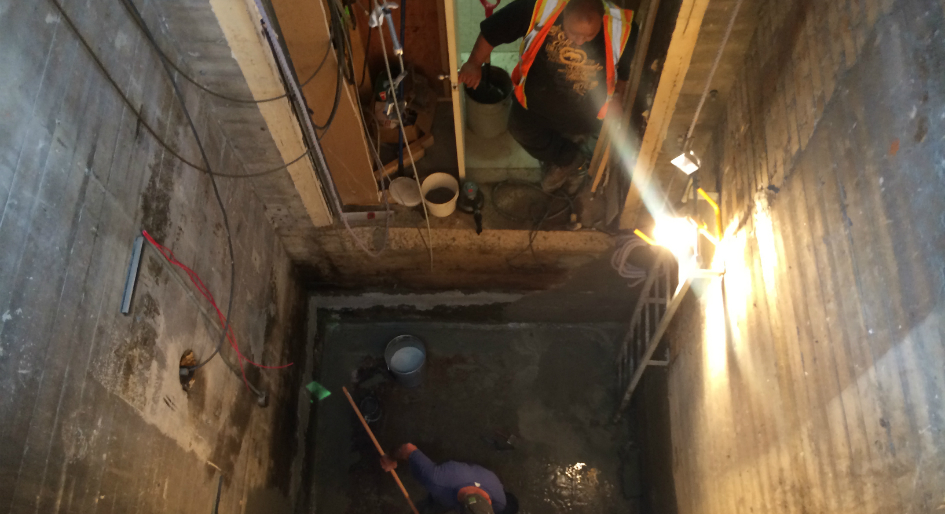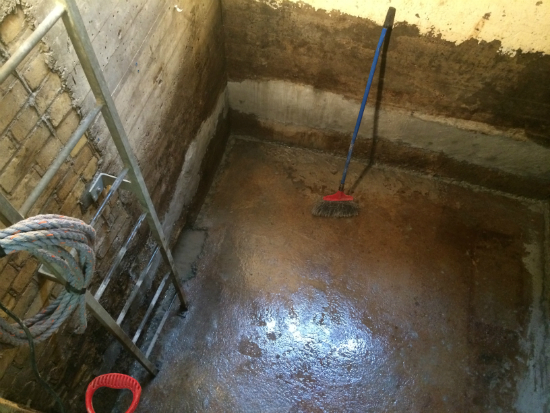When water damage is left unchecked, even the smallest drip can become a major headache. This is especially true for leakage in elevator pits, where damage caused by water can add up to significant safety risks and expensive repairs.
For a deeper look at the causes and solutions to elevator pit water leakage, we spoke with James Cooper, an Associate with RJC Engineers (RJC).
First, how common is water leakage in building elevator pits?
It’s very common; elevator pits are notorious for leakage. Typically, leakage occurs in early spring when the snow begins to melt and the building (or surrounding area) is subject to heavy rainfalls, and then in the fall when groundwater levels tend to rise as well. That said, it really can happen at any time of the year. Groundwater or run-off will always find the lowest place in your building to rest, which is always the elevator pit.
What kind of damage are we talking?
Once you start getting water in your pit, it can begin to corrode a lot of sensitive equipment like tracks, weights, counterbalances, springs, and electrical components. If you have hydraulic elevators, water will also harm the pistons and contaminate the hydraulic fluids. All of that can be very expensive to deal with if left unchecked.
What about the safety risks?
There are certainly safety issues at play if your elevator components are corroding. That’s why the Technical Standards Safety Authority (TSSA) doesn’t like water in elevator pits, and why they’ll compel the property manager/owner to get someone in to fix it.
What can be done by building staff?
There’s nothing a property manager or maintenance professional can do themselves because it involves very sensitive work in a restricted space. You need an elevator technician to go shut down the elevator and coordinate the investigation, and then you need a professional solution once they get in there.
And that’s where engineers come in?
Right. Elevator technicians do monthly or semi-monthly inspections, and that’s the best time for engineers like us to get in and do our inspections so the client doesn’t get charged an extra visit. Once we’re in there, we do a thorough review from within the pit, identify the problems, and develop solutions that we can then designed by us and tendered to experienced contractors who execute the work.
What are those solutions?
There are a few. Typically, it involves removing component of the elevator systems like plates and protective covers to reveal as much of the bare foundation wall as possible. Next comes what’s called crack injection with a polyurethane product to fill any cracks in the actual elevator foundation walls to stop the major paths of water from getting into the pit. From there, crews will come in with a crystalline waterproofing system and coat the entire interior surface of the elevator pit including the floor slab to prevent water from getting in.

Also, there are lots of bolt holes and anchor spots you can’t remove because doing so would mean removing the entire elevator. You then have to work around those by using sealants or other urethane-compatible products to try to trap that water.
The other thing we’ve done in the past is try to drain the water out of the elevator pit by drilling holes into the wall and connecting those with piping directly to either an adjacent sump pit or a drain that might already be in the elevator pit.
Any final advice?
It’s all about being proactive versus reactive. If there’s any concern about elevator pit water leakage, get an engineer like us in there and we’ll do a review, write a report, and give you recommendations right away.
It’s bad if you wait. Once water starts to get in, it starts to find multiple ways in and then you end up with a lot more work with injection and similar issues. The sooner you can see that you’re getting a problem with water you want to start dealing with it. You don’t want to wait until it’s a waterfall down there.
James Cooper, P.Eng, is an Associate with RJC. For more, visit https://www.rjc.ca/.





